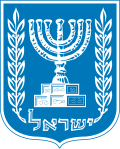| ||||||||||||||
| ||||||||||||||
| ||||||||||||||
| Part of a series on the |
 |
|---|
An election for President of Israel was held in the Knesset on 31 July 2000, [1] following Ezer Weizman's resignation.
| ||||||||||||||
| ||||||||||||||
| ||||||||||||||
| Part of a series on the |
 |
|---|
An election for President of Israel was held in the Knesset on 31 July 2000, [1] following Ezer Weizman's resignation.
Moshe Katsav, a Likud politician, ran against Shimon Peres, a previous Prime Minister of Israel. In a surprising upset, the Knesset elected Katsav, by 63 to 57. Katsav assumed office as President of Israel on 1 August 2000. He was the first Israeli president sworn in for a seven-year term, as well as the first candidate from the right-wing Likud party to be elected to the office.
| Candidate | Party | First round | Second round | |||
|---|---|---|---|---|---|---|
| Votes | % | Votes | % | |||
| Moshe Katsav | Likud | 60 | 51.28 | 63 | 52.50 | |
| Shimon Peres | One Israel | 57 | 48.72 | 57 | 47.50 | |
| Total | 117 | 100.00 | 120 | 100.00 | ||
| Valid votes | 117 | 97.50 | 120 | 100.00 | ||
| Invalid votes | 0 | 0.00 | 0 | 0.00 | ||
| Blank votes | 3 | 2.50 | 0 | 0.00 | ||
| Total votes | 120 | 100.00 | 120 | 100.00 | ||
| Registered voters/turnout | 120 | 100.00 | 120 | 100.00 | ||